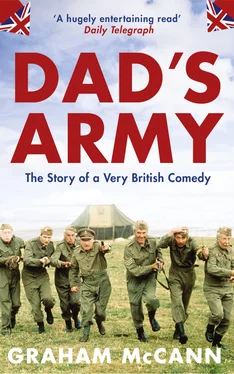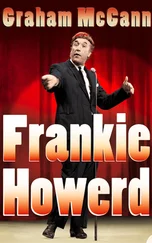Graham McCann - Dad’s Army - The Story of a Very British Comedy
Здесь есть возможность читать онлайн «Graham McCann - Dad’s Army - The Story of a Very British Comedy» — ознакомительный отрывок электронной книги совершенно бесплатно, а после прочтения отрывка купить полную версию. В некоторых случаях можно слушать аудио, скачать через торрент в формате fb2 и присутствует краткое содержание. Жанр: unrecognised, на английском языке. Описание произведения, (предисловие) а так же отзывы посетителей доступны на портале библиотеки ЛибКат.
- Название:Dad’s Army: The Story of a Very British Comedy
- Автор:
- Жанр:
- Год:неизвестен
- ISBN:нет данных
- Рейтинг книги:5 / 5. Голосов: 1
-
Избранное:Добавить в избранное
- Отзывы:
-
Ваша оценка:
- 100
- 1
- 2
- 3
- 4
- 5
Dad’s Army: The Story of a Very British Comedy: краткое содержание, описание и аннотация
Предлагаем к чтению аннотацию, описание, краткое содержание или предисловие (зависит от того, что написал сам автор книги «Dad’s Army: The Story of a Very British Comedy»). Если вы не нашли необходимую информацию о книге — напишите в комментариях, мы постараемся отыскать её.
Dad’s Army: The Story of a Very British Comedy — читать онлайн ознакомительный отрывок
Ниже представлен текст книги, разбитый по страницам. Система сохранения места последней прочитанной страницы, позволяет с удобством читать онлайн бесплатно книгу «Dad’s Army: The Story of a Very British Comedy», без необходимости каждый раз заново искать на чём Вы остановились. Поставьте закладку, и сможете в любой момент перейти на страницу, на которой закончили чтение.
Интервал:
Закладка:
Ann Callender said to me, ‘I’m going to take you out to lunch, darling.’ Which she did. And she said, ‘By the way, I forgot to tell you that David Croft is my husband.’ And my face obviously dropped, because then she said, ‘Yes. That’s exactly why we didn’t tell you. But you got the part because he wants you. And I’d just like to point out – don’t forget that he can always write you out!’ 47
Once Pike had been picked, Croft turned his attention to the supporting players. John Ringham, an experienced, self-styled ‘jobbing character actor’, 48 was chosen to play Private Bracewell, the Wodehousian silly ass from the City; Janet Davies, a bright, reliable performer whom Croft had used in a recent episode of Beggar My Neighbour , was hired as Mrs Mavis Pike; 49 Caroline Dowdeswell was recruited to play junior clerk Janet King (a hastily drawn character introduced after Michael Mills had declared that the show needed a soupçon of sex); 50 Gordon Peters, a former stand-up comic who specialised in playing Hancock-style characters, was drafted in for the one-off role of the fire chief; and several seasoned professionals – including Colin Bean, Richard Jacques, Hugh Hastings, George Hancock, Vic Taylor, Richard Kitteridge, Vernon Drake, Hugh Cecil, Frank Godfrey, Jimmy Mac, David Seaforth and Desmond Cullum-Jones – were engaged (at six guineas each per episode) to make up the platoon’s back row. 51 One character now remained to be cast: the nasty, nosy, noisy ARP warden.
Croft thought more or less immediately of Bill Pertwee. Pertwee, in real life, could not have been less like the loud and loutish character Croft and Perry had created to darken Mainwaring’s moods, but he was quite capable of investing such a role with a degree of comic vulnerability that would lift it far above the realm of caricature. Like his cousin, Jon, Bill Pertwee came to television after learning his craft both in Variety – first as a colleague of Beryl Reid, later in partnership with his wife, Marion MacLeod – and radio – as a valued and versatile contributor to both Beyond Our Ken (1958–64) and Round the Horne (1965–7). After catching the eye in a series of The Norman Vaughan Show on BBC1 in 1966, he found himself increasingly in demand not only for comic cameos but also as a warm-up man for various television shows, and he started to think more seriously about pursuing work in the medium ‘to add another string to one’s bow, as it were’. 52 In 1968, just as he was preparing for a season of performances at Bognor Regis, he heard from David Croft:
I’d worked for David the previous year. It was just a small part in an episode of Hugh and I with Terry Scott and Hugh Lloyd: I’d only had a couple of lines, but I had to shout at Terry Scott and push him around a wee bit in a cinema queue. That must have stuck in David’s mind, because when he was casting Dad’s Army he rang up the agency I was with [Richard Stone], found out that I was probably available and gave me a call. He said, ‘I’m starting a programme about the Home Guard, and I’ve got these couple of lines for an air-raid warden. You just come into an office and shout a bit and then go out again.’ And that was it – that was how he cast me in that. 53
Even though the air-raid warden was not, at that stage, conceived of as a regular character, Croft knew that Pertwee could be relied on not only to turn in the kind of spirited performance he required to test the role’s comic potential, but also to inject some welcome energy and good humour into a company of tough and occasionally testy old professionals. ‘I booked Bill because he was good, of course, but I also booked him in order to keep everyone else happy and sweet. He was always very bubbly, very well liked by everyone, and he’s marvellous fun.’ 54
The casting, at last, was complete, and Croft regarded the ensemble that he had assembled with a considerable amount of satisfaction: ‘The cast that you started out thinking about is never the same as the one you finish up with, but I was pretty pleased with the line-up we’d managed to get. There was a great deal of quality there.’ 55 He looked ahead at all the potential clashes of egos, all the possible conflicts of ambition, all the inevitable accidents (happy and otherwise), all the long drawn-out set-ups and last-minute revisions, all the budgetary worries, all the problems with props and people and performances, and he could not wait to get started. He was ready to make a television programme.
THE COMEDY
There’s nothing funny on paper. All you are playing with is a bagful of potential. Even when the show’s written you haven’t got anything. Comedy is like a torch battery – there is no point in it until the circuit is complete and the bulb, which is the audience, lights up. It is how strongly the bulb lights up which determines how well you have done your job .
FRANK MUIR 1
CHAPTER IV The Pilot
You put your head on the block every time you televise comedy, for everybody in the audience is an expert in a way that they never are with drama .
DUNCAN WOOD 1
It’s folly – sheer folly!/I never doubted you could do it!
PRIVATE FRAZER 2
The atmosphere, according to Jimmy Perry, was ‘very tense’ 3 on the chilly morning at the end of March 1968 when the cast came together for the first time. In those days, before the construction of the BBC’s own rehearsal rooms in North Acton, programmes were prepared in a wide variety of unlikely-looking venues secreted among London’s least alluring nooks and crannies, and, in the case of Dad’s Army , the site for the initial read-through was a stale-smelling back room of The Feathers public house in Chiswick. Here, seated side-by-side around a large mud-coloured table, were the actors whose task it now was to bring the inhabitants of Walmington-on-Sea into life. ‘I looked at that motley crew,’ remembered Perry, ‘and I thought to myself: “This is either going to be my biggest success or my biggest failure – it all depends how they get on.”’ 4
Some of them – such as Clive Dunn and John Le Mesurier – were old friends; others – such as Arthur Lowe and Arnold Ridley – were merely vague acquaintances; and a few – such as James Beck and Ian Lavender – were total strangers. David Croft took all of the nervy uncertainty in his stride – he was used to the awkwardness of these occasions – but Jimmy Perry could not help scrutinising every look, every nuance, every mild little moan and over-loud laugh for portents of good days or bad days to come. His spirits sagged when John Laurie turned to him and said in a voice of casual menace, ‘I hope this is going to work, laddie, but to my mind it’s a ridiculous idea!’, but later, during a coffee break, they were revived when Bill Pertwee came over and assured him that the show was ‘going to be a winner’. 5 He remained, nonetheless, over-sensitive and apprehensive; this had been his big idea, his personal project, and now it was set to be tested.
Preparations had certainly been thorough. David Croft was determined to make the programme seem as true to its period as was humanly possible. Any line that sounded too ‘modern’, such as ‘I couldn’t care less’, was swiftly removed from the script. The services of E. V. H. Emmett, the voice of the old Gaumont-British newsreels from the 1930s and 1940s, were secured to supply some suitably evocative scene-setting narration. Two talented and meticulous set designers, Alan Hunter-Craig and Paul Joel, were brought in to create a range of believably 1940s-style surroundings, and, after researching the era at the Imperial War Museum, they either found or fabricated the right kinds of food – Spam, snoek, dried egg, fat bacon pieces, rabbit, potatoes, cabbages and carrots – brands – Camp coffee, Typhoo tea, Bird’s custard, Brown’s ‘Harrison Glory’ peas, Porter’s ‘Victory’ self-raising flour, Orlox beef suet, Horlicks tablets, SAXA salt, Sunlight soap, Craven ‘A’ cigarettes – furniture – elderly desks, ‘utility’-style shelves, sideboards, cabinets – portraits – of the King and Queen, and Churchill (‘Let Us Go Forward Together’) – and posters – bearing such advice as ‘Keep it under your hat’, ‘Hitler will send no warning’ and ‘Keep it dark’ – to ensure that every home, hall, bank and butcher’s shop in Walmington-on-Sea would reach the screen reflecting a richly authentic wartime look. Sandra Exelby, an accomplished BBC make-up specialist, developed a variety of period hairstyles and wigs, while George Ward, the costume designer, searched far and wide for genuine LDV and Home Guard brassards, badges, boots, uniforms, respirators and weapons, ordering what other outfits were needed from Berman’s, a London costumier (and he made a point of having Captain Mainwaring’s uniform made from out of a slightly superior quality material in order to reflect the higher salary he would, as a bank manager, have received). Someone even managed to find an old pair of round-rimmed spectacles for Arthur Lowe to wear.
Читать дальшеИнтервал:
Закладка:
Похожие книги на «Dad’s Army: The Story of a Very British Comedy»
Представляем Вашему вниманию похожие книги на «Dad’s Army: The Story of a Very British Comedy» списком для выбора. Мы отобрали схожую по названию и смыслу литературу в надежде предоставить читателям больше вариантов отыскать новые, интересные, ещё непрочитанные произведения.
Обсуждение, отзывы о книге «Dad’s Army: The Story of a Very British Comedy» и просто собственные мнения читателей. Оставьте ваши комментарии, напишите, что Вы думаете о произведении, его смысле или главных героях. Укажите что конкретно понравилось, а что нет, и почему Вы так считаете.












